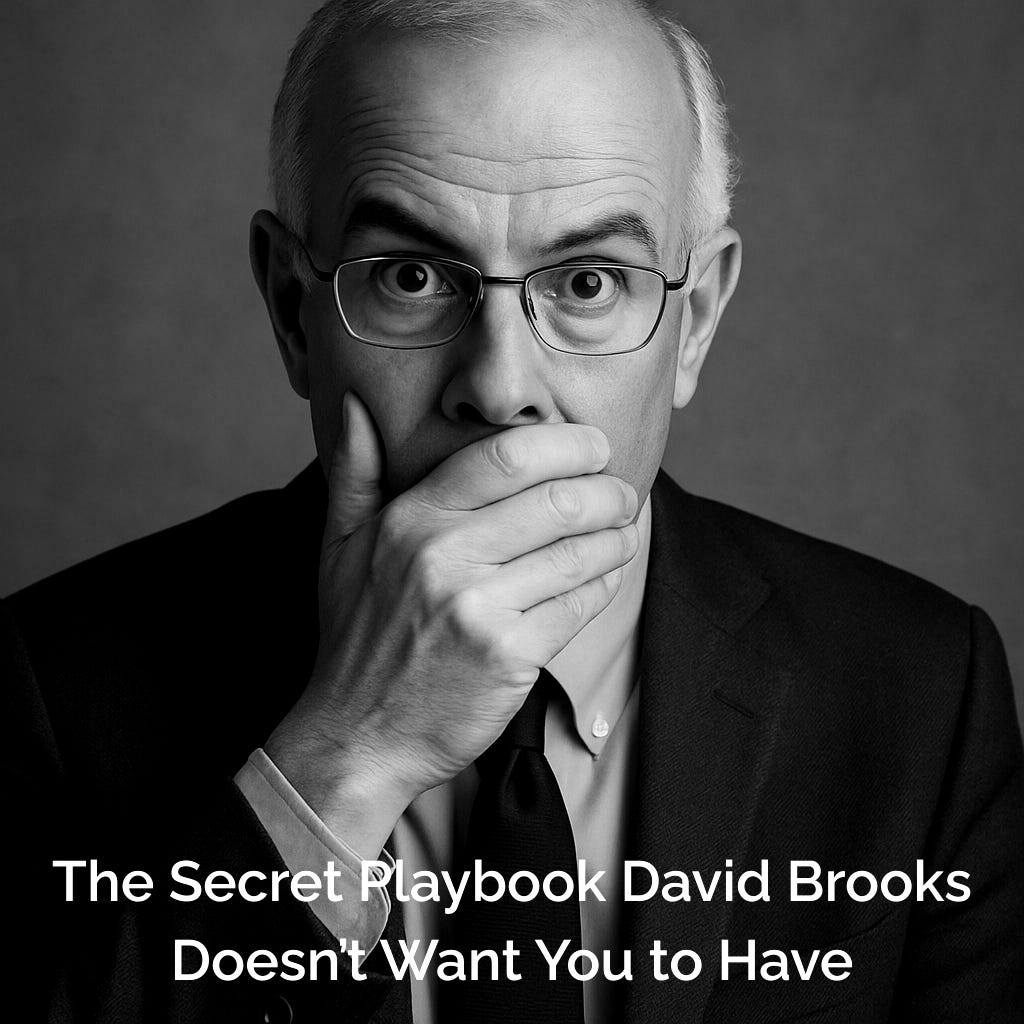TLDR: The Feel-Good Lie
As the knives come out for America’s elite institutions—threats to revoke nonprofit status, cut federal funding, and dismantle Ivy League governance—it’s worth asking what exactly is under attack. Are these schools targets because they’re elite? Or because they’re effective?
While a war is waged on the machinery of American greatness, figures like David Brooks are undermining it from within—telling the professional class to second-guess the very parenting strategies that got them to the top.
His piece in The Atlantic, “How the Ivy League Broke America,” landed quietly in the weeks after the election, but it’s grown louder in this new climate. Brooks argues that the elite parenting model based on aspiring for admission to the Ivy League and its selective peers is a resume-stuffing, overcoaching, and anxiety-inducing mess. That the real problem isn’t inequality, but the white-collar obsession with control and perfection. His fix? Stop. Back off. Adopt what he calls blue-collar parenting strategies.
It sounds profound but it isn’t. There isn’t a single piece of data in the entire article that supports this narrative. No longitudinal studies. No mobility research. No international benchmarks. And now, as anti-Ivy sentiment surges and populist resentment paints elite institutions as villains, Brooks’s essay looks less like cultural introspection and more like elite self-sabotage.
Because what he and others of his sort are offering isn’t analysis. It’s catharsis. A guilt-relieving bedtime story for upper-middle-class Americans. His plot: America’s professionals built a ruthlessly effective playbook for upward mobility. Now they’re regretting it. The solution? Do less. Chill out.
But the truth is the only people who can afford to believe that are already at the top. Everyone else: immigrants, strivers, first-gens, working-class parents—still needs the escalator. And what Brooks is really doing is telling them to stop climbing before they reach their destination.
He opens with a caricature: today’s elite parenting is overstructured, neurotic, too focused on metrics. But he never asks the only question that matters: does it work?
Spoiler: yes.
Children raised by college-educated professionals dominate across every long-term outcome that counts: educational attainment, income, marriage stability, homeownership, even physical and mental health. Structured parenting doesn’t guarantee success, but it dramatically increases the odds.
Brooks isn’t critiquing failure. He’s critiquing success. And hoping you’re too sentimental to notice.

What the Data Actually Says
There’s a popular story making the rounds, that elite parenting has gone too far. That it’s all performance, no substance. That the SAT tutors, Mandarin lessons, and STEM camps are just signs of anxiety dressed up as strategy.
This story falls apart the minute you look at outcomes.
Kids raised in professional-class households, by parents with degrees, structure, and expectations, do better. They finish more school. They earn more. They’re healthier, more stable, more likely to marry and stay married. That’s not some trick of the system. It’s the result of years of consistent, compounding investment. Not just money—time, structure, discipline, expectations.
Sociologist Annette Lareau called it “concerted cultivation.” Structured time, constant conversation, adult-like treatment of children, immersion in institutional settings. Kids raised this way learn how to talk to teachers, negotiate with authority, apply for things, ask for exceptions, fight for their outcomes. These are the social skills the world runs on. It’s capacity building.
Compare that to the “natural growth” model. Less structure, more autonomy, less oversight. The kind of parenting people like Brooks are recommending society now embrace. It may foster independence and deliver memories of an idyllic childhood, but it leaves a gap when it comes to navigating a complex, competitive world. That’s what elite parenting teaches, whether critics want to admit it or not.
Mental health is another talking point used to discredit this model. But the data is muddy at best. Strip out the impact of social media and chaotic households, and higher-income kids raised in structured homes often fare better—emotionally and psychologically—than the narrative suggests.
The Skills Gap Is a Parenting Gap
America doesn’t have too many overachievers. The people complaining about “hyper-parenting” seem to think we’re producing legions of burned-out kids. What we’re actually producing—at scale—is a workforce that is unready to compete in the real world, which doesn’t end at our borders. The real crisis isn’t kids doing too much. It’s kids not being equipped to do enough.
Start with the basics. STEM jobs are growing twice as fast as non-STEM. We don’t have enough engineers, data scientists, or technical specialists to fill them. And we’re not talking about just top 1% genius-level talent. We’re talking about solid, competent, systems-literate professionals. People who can show up, think clearly, and execute.

That kind of capacity doesn’t get built by accident. And because the U.S. has not been building it internally in the necessary volume, it must import it, at an accelerating pace, from around the world.
Individuals capable of performing these roles typically require years of structured development. From parenting that is deliberate. Focused. Unapologetically future-oriented. The schedules, the enrichment, the relentless push to level up is what it takes. The people calling it excessive are usually the ones who don’t have to compete anymore.
The economy doesn’t care how anyone feels about this. It rewards people who are prepared. And the ones who aren’t—who were told they’d be fine if they just stayed curious and found their passion—end up on the sidelines. Or angry. Or both.
The U.S. has a talent readiness shortage, and the parenting model that’s being ridiculed along with the institutions that produce America’s best, are what is standing between our present capabilities and falling even further behind.
Why Immigrants Succeed
Look at the data. First- and second-generation immigrant children outperform native-born peers across the board—standardized tests, selective school admissions, STEM degrees, career outcomes.
Immigrant families, many of them from humble origins, from places where failure has real consequences, don’t buy into the myth of letting kids “find their way.” They structure. They push. They prepare. Not only because they’re chasing status, but because they’ve seen what life looks like without a safety net. For them, high-effort parenting isn’t a neurosis, it’s love.
The playbook they follow is the same one Brooks is telling you to distance yourself from. Early mastery of math. Limited distractions. Academic summer programs. Expectations, not affirmations. And it works—not because it’s perfect, but because it aligns with how power, skill, and opportunity are actually distributed.
You want to understand the stakes? Look at who’s getting hired. Who’s building the tools. Who’s making the shortlists. It’s not kids raised on autonomy and good vibes. It’s the ones who were overprepared by design.
So while some cultural critics wring their hands about overparenting, the people still playing to win aren’t backing off. They’re using the same tools—structure, sacrifice, repetition—and gaining ground.
When Elites Disown the Playbook
It’s one thing when populists attack upper middle class parenting from the outside. It’s another when the critique comes from inside the house. People who benefited from structure, enrichment, and relentless preparation are now telling others to ease up. To chill.
This kind of cultural whiplash isn’t harmless. It creates confusion, especially for families still trying to break through. They hear mixed signals: push hard, but don’t overdo it. Prioritize education, but don’t stress your kids. Be invested, but not intense. And when elite voices start framing ambition as pathology, the message that trickles down is simple: stop trying so hard.
That message is poison.
Because while the rhetoric shifts, the behavior rarely does. The same parents telling others to relax still quietly maintain the edge: still hire the tutors, still track the milestones, still make the right calls at the right time. The only thing that changes is the optics.
Meanwhile, the ones who believe the narrative—the ones who take their foot off the gas—fall behind. And no one circles back to explain why the rules seemed to work for some and not others.
This isn’t humility. It’s a sleight of hand.
Disowning the playbook doesn’t democratize success. It just makes it harder to copy. And the people who pay for that aren’t at the top, they’re the ones trying to get there.
What a Competent Society Actually Requires
Let’s take a step back and look at what a competitive, functioning country actually needs.
It needs people who can think clearly. Who can manage complexity, solve real problems, and operate under pressure. People who can lead, build, analyze, adapt. These are not a cultural preferences.
And to get there, you need intention. Deliberate development. Through habits built early, through expectations that aren’t constantly renegotiated, through families that understand the gap between “letting kids be kids” and setting them up to thrive. Competence isn’t spontaneous. It’s engineered.
The critique of high-effort parenting keeps missing this. It gets stuck in the optics—how it looks from the outside—without asking what’s actually being built. But when you look at the outcomes, the picture gets clearer. Structured homes produce capable people. Not always. Not perfectly. But far more often than the alternatives.
This isn’t about turning childhood into a resume. It’s about recognizing that the margin for error is narrowing, not widening. That the jobs worth having—and the institutions worth leading—go to people who’ve prepared for them.
A competent society doesn’t shame the people trying hardest to build competence. It studies them. It supports them. It scales what they’ve figured out.
High-effort parenting isn’t the problem. It’s one of the things in this country that’s still aligned with how progress is actually made. The answer isn’t to guilt people out of it. The answer is to make sure more people can do it—affordably, sustainably, and without having to apologize for wanting their kids to be prepared.
So no—don’t chill. Don’t pull back. Parent like it matters. Because it does.







